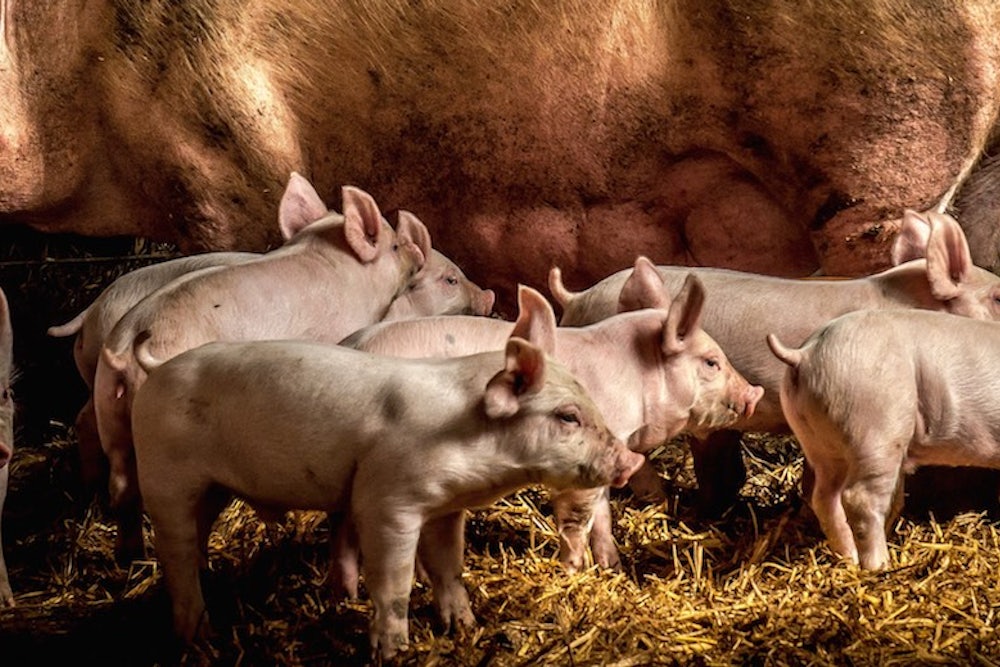If France is known for anything, it’s those mouthwatering arrays of raw-milk cheeses and cured meats served with excellent local wine at charming bistros on side streets where tourists have never ventured. French people savor their Reblochon, Rosette de Lyon, and Sauvignon at whichever hour of the day their American equivalents grab a plastic-wrapped muffin. If France gets to be known for two things, however, one might add secularism, or laïcité, to the mix.
At the very French intersection of sausage and secularism, of laïcité and charcuterie, lies the latest Gallic controversy. In The Guardian, Angelique Chrisafis reports that some French towns—with former French president Nicolas Sarkozy’s approval —have begun scrapping the pork-free option that had long existed in many school cafeterias. In France, public school cafeterias, which are run by the towns, not the schools themselves, will generally take into account that observant Muslim and (in fewer numbers) Jewish families don’t want their kids tucking into pork chops. Secular restrictions prevent schools in most of France from labeling the pork alternative as halal or kosher, and technically they’re something more like halal- or kosher-style. The end result is that kids from different cultural backgrounds get to eat lunch, which seems like a tough cause to argue against, yet some are doing just that. Chrisafis lays out the overarching political implications—the now-classic story of French secularism overlapping with French xenophobia—as well as the impact the shift is having on French Muslim schoolchildren, who are now getting conflicting messages from home and school about which ingredients must or must not be consumed. As with the debate over headscarves in schools, the state has opted to put schoolchildren from marginalized communities on the spot, as though doing so were a potentially effective way of encouraging inclusivity or assimilation.
If you come from a society that celebrates individual and collective self-expression through dietary choice, it’s easy to jump immediately to the right answer—that these towns are being ridiculous—but for the wrong reasons. There is a positive value in the French approach to food, as Pamela Druckerman argued last spring in The New York Times. In France (according to the Anglophone fantasy, and, at times, the French reality), there’s no picky eating, no medicalized eating, and no snacking, just the thrice-daily enjoyment of delicious, inadvertently wholesome meals, including pains au chocolat which, if consumed in France, take on the nutritional characteristics of unsweetened oatmeal. Yet it’s not just about what eaten, but how. It’s socially isolating, Druckerman wrote, to have a list of ingredients you’ll categorically reject. As Druckerman and goodness knows how many other English-language food writers have argued in recent years, it’s psychologically and even physically healthier to eat a traditional French (or traditional, period) diet than it is to obsess over the nutritional labels of processed foods. For whatever reason, France has become a stand-in for the old ways of doing things. And a society that frowns on gluten-free or spinach-aversion is going to have issues with religious dietary restrictions, even setting aside the various xenophobic objections that are, I’d argue, ultimately at the heart of all this. The biggest surprise, to the non-French observer, might be that there were pork alternatives offered in the first place.

Druckerman’s column neatly ducked the question of religious dietary restrictions, so allow me: While the religious-liberty (in the human-rights sense, not the U.S.-specific one) case for allowing them is strong, these restrictions have many of the same drawbacks as their (ostensibly) secular equivalents. To say that such religious dietary restrictions impede interfaith sociability isn’t to malign them—that’s part of their purpose. So if the pork-it-is move were just gently pushing those of all backgrounds towards a “French” way of thinking about food, fair enough. It’s not the American way, and does somewhat unnerve me as a secular American Jew. But as the good U.S. multiculturalist that I am, I suppose I always end up thinking that it’s also problematic to impose specifically American approaches to integration on France. If they’re more assimilationist than we are, but it’s out of a genuine belief that this is what will put French people of all backgrounds on a level playing field, then who am I to judge their methods?
However! The problem here isn’t that French Muslim and Jewish children might, outside the home, encounter value systems and ingredients in conflict with their families’ own. It’s that “pork” isn’t pork. It’s a proxy for difference, and not strictly religious difference. As with the “identity soup” debacle of almost a decade ago, where a soup kitchen served pork soup to make a point, pork is a way of being intentionally exclusionary. In a Guardian piece last year about what he brilliantly called “pig-whistle politics,” Gavan Titley listed a range of incidents across Europe in which the ingredient made a far less nuanced political appearance:
Pork has become a racist meme, endlessly adapted through practices of harassment: mosques in Europe have had pig’s heads nailed to their doors, pork-filled envelopes sent in the mail, slices of ham rubbed on door handles, bacon slices slipped in the shoes of worshippers as they prayed.
And what to make of this passage from the more recent Guardian piece:
Since January’s terrorist attacks–in which French Islamic extremists left 17 dead after the shootings at the satirical magazine Charlie Hebdo and a kosher supermarket in Paris–laïcité has been repeatedly used by political parties as a catch-all answer to society’s ills.
It would almost seem that French politicians were blaming not just the Islamic extremists responsible for those attacks, along with all the many, many Muslims who abhor such acts but who also abstain from pork, but also the Jewish victims, as though they somehow got what was coming to them, shopping at a supermarket with a cultural and religious specificity, rather than at the local Franprix. It would almost seem that the issue isn’t that some observant Muslims and Jews are making a dietary choice that a lot of people make for other reasons, but rather that some people who are ethnically distinct—that is, distinct in ways they can’t control, and that have zilch to do with religious convictions—have had the audacity to live their lives in France. When common-enough, innocuous-enough behaviors (having food preferences, wearing a maxi-skirt, wearing a scarf, etc.) are associated with certain ethnic groups, somehow then and only then, the practices become fraught.
A glance at the French-language coverage of this debate reveals that French schoolchildren by and large get to choose their own meals, and that—what a surprise!—he pork-alternative issue is, much like the niqab “debate” here in Canada, a non-issue with symbolic appeal. In other words, it’s not that every French kid is presented with some exquisite set menu involving pork, and suddenly some new arrivals are asking for gluten-free turkey bacon. The people making a fuss are, it would appear, the aggressively pro-pork contingent. They’re the ones with the agenda.
There’s nothing racist about questioning the wisdom of voluntary dietary restrictions and including the religious variety. But French pork politics have a way of insulting and alienating even (would-be) omnivores of Muslim or Jewish background. That alienation, in turn, only increases the popularity of those very religious or cultural practices... which is, in a sense, the point. If children whose parents don’t want them eating pork start sending them to religious schools as a result, that doesn’t seem like the most efficient way to bring about a new generation of secular French people of Jewish or Muslim heritage. But maybe that was never the hope in the first place.
Thanks in no small part to the France’s traditionally race-blind bureaucracy, racist views have a way of hiding out behind secularist ones. This should be a concern not just to those who celebrate cultural diversity, but also to those who think the French assimilationist model works, or could work if somehow (miraculously) stripped of its racist elements. The French version of secularism is a problem not so much because it fails to celebrate (or even tolerate) cultural diversity, but because it’s fundamentally about preventing assimilation, not encouraging a too-thorough-for-U.S.-tastes version of it.
